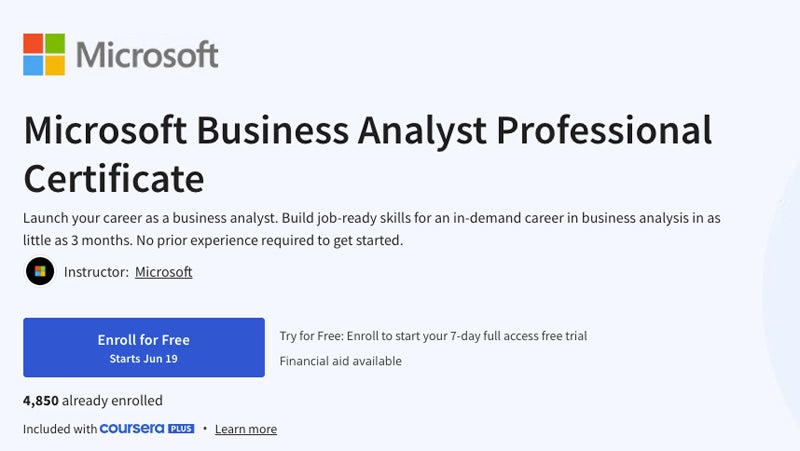Course spotlight: Microsoft Business Analyst Professional CertificateOur assessment: Best for aspiring business analysts Coursera’s Microsoft Business Analyst Professional Certificate is one of the best on the market for providing the fundamental skills required of a business analyst. In just three months, learners can gain practical experience in data analysis, visualization and reporting to prepare them for entry-level roles. It covers:
|
Launching a career as a business analyst requires a blend of analytical skills and business acumen. The main objective of the role is to bridge the gap between business needs and technical solutions.
Business analysts are responsible for understanding the business processes, identifying areas for improvement and defining the requirements for new systems or upgrades. Specifically, this could involve creating data models, communicating with different departments about their needs, researching new technologies, and creating reports or presentations of results.
Investing in the correct technology is very important to businesses, so demand for business analysts is high. According to the U.S. Bureau of Labor Statistics, the demand for management analysts, which includes business analysts, will grow by 10% between 2022 and 2032 — much faster than the average for all occupations.
Whether you’re researching your first job, transitioning from a different area of business or embarking on a complete career change, this guide will provide all the information you need to become a successful business analyst. It covers:
- What a business analyst does.
- The average salary of a business analyst.
- How to launch a career as a business analyst.
- The best business analyst courses.
Disclaimer: This article is sponsored by Coursera.
What does a business analyst do?
A business analyst is responsible for a number of tasks to help improve business efficiency, including:
- Conducting interviews, workshops and surveys with stakeholders to understand their requirements and goals.
- Creating documentation of business requirements and use cases.
- Using SQL and Excel to identify trends, issues and opportunities for improvement in large data sets.
- Compiling charts, tables and other elements of data visualization.
- Evaluating technical solutions to determine which one best meets the business needs.
- Forecasting, budgeting and performing variance and financial analysis to support decision making.
- Supporting staff through changes and organizing testing and quality checks after changes have been made.
SEE: 87 Excel Tips and Tricks: From Beginners to Pros
What is the average business analyst salary?
According to Glassdoor, the average annual salary of a business analyst in the U.S. is between $70,000 and $118,000, with an average additional pay, including any bonuses or profit sharing, of $36,000.
The average salary for a business analyst in the UK is between £32,000 and £54,000 a year, depending on location and level of experience, while additional pay is an average of £3,000.
What skills are required to be a business analyst?
While many business analyst roles do not require a specific set of skills, there are a number of skills that will assist greatly with day-to-day tasks or that you may be required to learn on the job. These skills include:
- Data analysis: Proficiency in analyzing datasets, identifying trends and making decisions based on the data is often required in the role.
- SQL: Structured Query Language is used for data extraction and manipulation in databases. Its use can significantly speed up the process of data analysis.
- Excel: Knowledge of pivot tables, charts and complex formulas can also improve efficiency in data analysis.
- Data visualization: Tools like Power BI and Tableau are used to create interactive and visually appealing data visualizations, making it easier to interpret complex data sets.
- Basic programming: Familiarity with programming languages such as Python and R can help in automating data analysis tasks.
- Project management tools: Jira, Trello and Asana are tools commonly used by business analysts to plan, track and manage project tasks.
- Business acumen: A solid understanding of business operations, strategies and financial principles will help an analyst make more suitable decisions.
- Communication: Communication skills, both written and verbal, are key for business analysts for clearly conveying ideas and findings to stakeholders.
- Project coordination: Proficiency in this area comes from experience assisting in the planning, execution and monitoring of projects, as well as innate organizational skills.
Be sure to highlight these skills or experiences where you have demonstrated them on your résumé or CV when applying for your first business analyst role.
SEE: How to Query Multiple Tables in SQL
How do you launch a career as a business analyst?
As the role of business analyst is so varied, so are the routes into it. There is no set formula to landing that first job; however, there are a number of actions that will take you in the right direction.
Earn a degree
Hiring managers will typically consider a wide range of degree types when assessing candidates for a business analyst role, as there are many transferable skills that can be picked up in different fields of study.
An undergraduate degree in a business-related field (e.g., accounting, business information systems, business studies, economics or finance) will likely be the most relevant and also show that you are interested in the industry.
Most STEM degrees, like math, engineering and computer science, will also provide the necessary technical skills, including knowledge of statistics, programming, modeling and Excel as well as ability to perform research and conduct presentations.
If you already have an undergraduate degree, you might consider an additional post-graduate qualification, such as a Master of Business Administration or a masters in a relevant field like business analytics.
However, neither an undergraduate nor a postgraduate degree is an essential prerequisite for many business analyst roles.
Obtain work experience
Work experience is another great way of earning the skills necessary to get your first job as a business analyst and demonstrate your interest in the role. It also allows you to assess whether the job is right for you. This work experience can be obtained through a short-term placement, internship or apprenticeship.
These resources for U.S.-based applicants may help you find a relevant placement:
Here are resources for UK-based applicants, including internships and apprenticeship schemes:
- Find an apprenticeship service. The government also offers a business analyst apprenticeship program.
- Gradcracker.
- Amazon Business Analyst apprenticeship or internship.
- QA Business Analyst apprenticeship.
- Transport for London Business Analyst apprenticeship.
- McKinsey & Company Business Analyst internship.
Take a course or certification
There are numerous courses available that are either specific to business analysts or will provide you with some of the necessary skills to break into the industry.
Professional qualifications are offered by the International Institute of Business Analysis and range from entry level to ones that require a number of years of experience as a business analyst. Such courses also involve quite significant financial contributions. For example, the exam alone for the IIBA Entry Certificate in Business Analysis is currently available for $350.
While expensive, having a recognised certification can make your application stand out and show the hiring manager that you have the skills, knowledge and passion necessary to do a good job. However, there are a number of other relevant qualifications that can be taken online, such as those offered by Coursera, for a much lower price or for free.
SEE: The All-Inclusive Business Analytics Certification Training Bundle
What are the best courses for aspiring business analysts?
Microsoft Business Analyst Professional Certificate — Coursera

The Microsoft Business Analyst Professional Certificate course prepares aspiring business analysts with the skills necessary for an entry-level position. Modules cover techniques for identifying business problems, using Microsoft Excel for data analysis and visualization, modeling business processes and data and communicating findings to stakeholders.
At the end of the course, learners complete a capstone project that puts the skills they’ve learned to the test in a real-life scenario that can be referred to in job interviews. The course can be completed from home and at one’s own pace, and its content is regularly updated to ensure it applies to today’s industry requirements.
Price
A Coursera subscription costs $49–$79 USD or £39 a month after a 7-day free trial.
Duration
Three months at 10 hours a week.
Business Analytics with Excel: Elementary to Advanced — Coursera

The Business Analytics with Excel course focuses on the essential skills for data analysis using Microsoft Excel. It covers basic to advanced Excel functions, data management techniques and descriptive statistics. It introduces learners to linear and integer optimization, decision analysis and risk modeling — all of which are common analytical frameworks used for business decision making.
Modules are structured with videos, practical exercises and quizzes to ensure the skills can be applied in real-world business cases. The course was prepared and is taught by academics from Johns Hopkins University, including associate mathematics professor Dr. Joseph Cutrone. Like the Microsoft course, this can be completed from home and at one’s own pace.
Price
$49 USD or £39 for a shareable certificate, or free for just the course materials.
Duration
Three weeks at seven hours a week.
Entry Certificate in Business Analysis — IIBA

The ECBA is a well-recognized certificate from the International Institute of Business Analysis designed specifically for individuals new to business analysis. It covers key knowledge areas from the BABOK Guide — the globally recognised standard for the practice of business analysis — including business analysis planning, requirements life cycle management, strategy analysis and more.
Gaining full certification involves completing at least 21 hours of professional development and passing a 50-question exam. This course requires a more significant financial commitment than those on Coursera.
Price
The certification exam costs $350 (£275), but the cost for the learning materials depends on their format (in-person course, guide book, etc). A two-day online course from The Knowledge Academy is currently priced at $2,523 (£1,995).
Duration
This is dependent on the resources and the learner themselves, but 4–6 weeks of self study is recommended.
Professional Certificate in Agile Business Analysis — BCS (UK only)

Agile methodology is a project management approach that breaks a large project down into smaller incremental steps known as sprints. This certification from the British Computer Society teaches the skills to effectively perform business analysis in agile environments. It covers agile methods in general before looking at specific agile analysis, modeling and documentation techniques. Learners will also gain an understanding of how to analyze business goals by breaking them into sprints and how to evaluate whether agile methods are appropriate for the situation.
This course requires a more significant financial commitment than those on Coursera.
Price
It depends on the practitioner, but prices tend to range from £1,300 to £2,500.
Duration
Three days, before a 90-minute exam.


